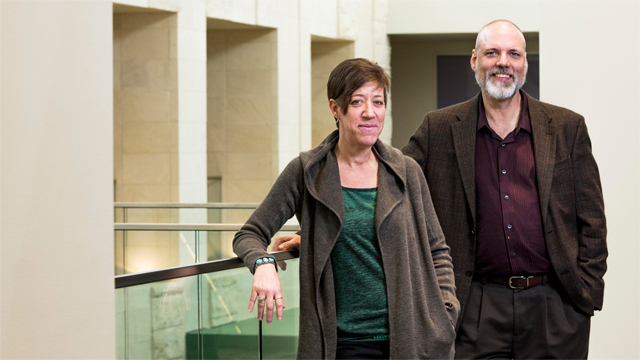DENTON, Texas (UNT) Two University of North Texas faculty members will have a semester off from teaching to concentrate on their own creative projects -- a groundbreaking documentary production and an ambitious composition.
 Melinda Levin, professor of media arts, director of the master of fine arts program in documentary production and studies, and coordinator of the division of communication media and performance in the College of Arts and Sciences, and Joseph Klein, Distinguished Teaching Professor of composition and chair of composition studies, have been named the 2016-17 Faculty Fellows from the Institute for the Advancement of the Arts.
Melinda Levin, professor of media arts, director of the master of fine arts program in documentary production and studies, and coordinator of the division of communication media and performance in the College of Arts and Sciences, and Joseph Klein, Distinguished Teaching Professor of composition and chair of composition studies, have been named the 2016-17 Faculty Fellows from the Institute for the Advancement of the Arts.
The IAA, the arm of UNT that promotes artistic and creative expression, began the Faculty Fellows program in 2009. Faculty members must apply for the program and describe the project they want to work on. A list of past winners can be found on the IAA Emeritus Fellows site.
Melinda Levin
Levin plans to capture a place of historical significance and cultural and environmental complexity with an innovative use of distribution technology.
For her documentary Middlesex: 42. °N, 71. °W, Levin will focus on an area in Middlesex County, Mass., just west of Boston that is centered by a farm that was founded by the family of President John Quincy Adams. This site encompasses The Old North Bridge, the site of one of the first battles in the American Revolutionary War; Walden Pond, popularized by philosopher Henry Thoreau; Hanscom Air Force Base, which is also a Superfund cleanup site; and dozens of organic farms.
"The seeds of the American revolution are right there," Levin said. "The genesis of American transcendentalism is as well. You have a lot of environmental, cultural and political issues there currently. It's just packed in this 3-mile circumference."
Levin plans to add another element besides the traditional documentary film. She is designing a web portal, called homing.device, that will allow anyone to pinpoint a particular three-dimensional geographic circumference and embed photographs, video and audio about the area, as well as scientific data, such as carbon emissions, water and soil sampling, and climate and migration patterns. It will also include sections for uploading historical information, maps, geotagging, census data and archival materials. The documentary Middlesex: 42.°N, 71.°W is designed in part to be a beta-test for the development of the homing.device open-access web portal.
The documentary is a change of pace for Levin, who is known for taking on international themes in her works. Her films have been seen on PBS and other broadcast outlets, and in museums and theaters around the world. She has taught at UNT for 20 years.
She is grateful to be able to focus on the project in spring 2017.
"To have that time and be very thoughtful and analytical about a place, I couldn't do it otherwise," Levin said. "It is an honor and privilege to receive this fellowship."
Joseph Klein
Klein plans to use his time to complete an ambitious composition that has been four years in the making and, when completed, will require 70 musicians distributed across 24 individual ensembles, each performing its own distinctive music.
The work, An Unaware Cosmos, was inspired by scientific inquiry and humankind's constant pursuit of knowledge.
An Unaware Cosmos pays homage to free thinkers such as Thomas Jefferson, Bertrand Russell, Charles Darwin, Carl Sagan and Stephen Hawking. Among other issues, the work addresses the human desire to impose structure and order on the universe.
His compositions have often been inspired by science, fractal geometry and systems theory. Klein, who has taught at UNT for 24 years, released the CD Improbable Encounters in 2014.
"Humans are always trying to make sense of things, often interpreting 'meaning' where none exists," he said. "With music, such preconceived notions limit our perceptions of how time may be structured."
An Unaware Cosmos upends these notions of musical structure by applying a modular approach to form. The individual pieces or "modules" - composed for two to five instruments each - are played simultaneously so that modules intersect in various ways.
He compares his piece to a set of Lego blocks, with each piece having distinctive qualities.
"What if you take these blocks and put them together in different ways?" he said. "Such constantly changing relationships define An Unaware Cosmos."
Klein has completed half of the composition thus far, and hopes to finish six modules this year and write another six during the fellowship period in the spring semester of 2017.
Klein plans to present the complete work in January 2018 at the Margot and Bill Winspear Performance Hall in the Murchison Performing Arts Center at UNT.
"Given the size and layout of Winspear Hall, that seems to be the perfect place to perform a work of this scope," he said. "I am grateful for the support of this IAA fellowship, which will make it possible to fully realize this project."

